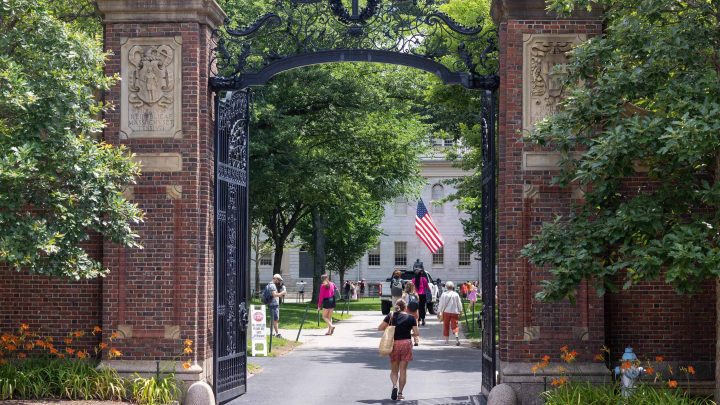
Campus labor activism spreads to undergrads

Late in October, undergraduate student assistants at Harvard and the University of Oregon voted overwhelmingly to unionize. And soon, nearly 20,000 student assistants at the 23 campuses of the California State University system — the largest in the country — will also hold a union election.
In recent years, there has been a wave of labor activism on college campuses, which is now trickling into the undergraduate ranks. Student workers in various jobs, from residence halls to campus radio stations, have unionized at more than a dozen schools in just the last year. That could have big implications for the workforce of the future.
Colin Culver, a student organizer at San Diego State University, is a fourth-year political science major and resident assistant. He’s not shy about approaching fellow students on the job.
“Have I talked to you guys about the union effort that’s been going on recently?” he asked help desk workers at the campus library.
Culver and other organizers had been gathering signatures since the spring for an election that could take place early next year. Now, he’s asking people what issues matter to them. Sick pay is one.
“I’m recovering from a cold. I had 12 hours in the past week that I didn’t get paid for,” Culver said. “I didn’t get paid for it, so that sucks.”
Student workers at the campus don’t get sick pay. They’re also exempt from some local minimum wage laws.
“I don’t know what y’all get paid here, but I get paid $15.50 an hour, which is below the minimum wage in San Diego County,” he told the library workers. “And that’s kind of something that’s pushed me to get involved with the campaign.”
Culver said that in months of canvassing, no one has said they’re not interested.
Approval of unions has been trending up for decades among Americans, according to recent Gallup polls, hitting levels not seen since the 1960s.
But Gen Z support is especially strong, said Toby Higbie, who’s been a professor of history and labor studies at the University of California, Los Angeles, for the last 15 years.
“When I first arrived, students were curious, but not really sure about it,” he said. “Today, my labor history classes are packed. Every single one of our labor studies classes is oversubscribed.”
He said college students face mounting debt and diminishing returns on their investment in their degrees. They came of age at a time of mass protest over racial injustice and gun violence.
And they have much more exposure to labor activism than previous generations did.
“During that period of union decline, from the ’80s on, it just got harder and harder for people to actually have that firsthand knowledge of what it meant to be connected to a union,” Higbie said.
College students today still might not have a personal connection — a parent or grandparent in a union, for instance. But they’ve watched workers at Starbucks, Trader Joe’s and Apple Stores unionize. Strike activity has surged.
And Higbie pointed out that many white-collar workers at museums, nonprofits and tech companies are taking collective action.
“Young people are kind of learning that we should be in solidarity with other workers. And this is how you get what you need,” he said. “It really does have the potential to have a big change on our, our political life broadly.”
That’s because many undergrad union members may be likely to take their engagement outside the academy.
In October, undergrad resident assistants unionized at Barnard College in New York City. They’re now negotiating their first contract, and sophomore Abigail Fixel is at the bargaining table.
“We try to figure out solutions that are fair, that are equitable,” she said. “It’s powerful.”
As an RA, she might benefit from a union contract for a couple of years at most, but she said the experience of collective bargaining will stick with her.
“I think unions are incredibly important,” Fixel said. “And I would be honored to be part of one after college.”
So would Colin Culver at San Diego State. He’s graduating in the spring, so he might never get the benefit of a contract — at least in this job. He said he wants to continue labor organizing after college. In the meantime, he’s got some homework to finish.
There’s a lot happening in the world. Through it all, Marketplace is here for you.
You rely on Marketplace to break down the world’s events and tell you how it affects you in a fact-based, approachable way. We rely on your financial support to keep making that possible.
Your donation today powers the independent journalism that you rely on. For just $5/month, you can help sustain Marketplace so we can keep reporting on the things that matter to you.

















